Key takeaways:
- Understanding and meticulously tracking every aspect of an event budget is crucial for financial clarity and successful planning.
- Creating a solid event schedule establishes rhythm and ensures a smoother experience for both participants and audience, while flexibility is key to managing unexpected changes.
- Collaboration with team members and sponsors can enhance budgeting and event planning, providing fresh perspectives and resources.
- Regular communication and feedback post-event are essential for improvement and team alignment in future projects.
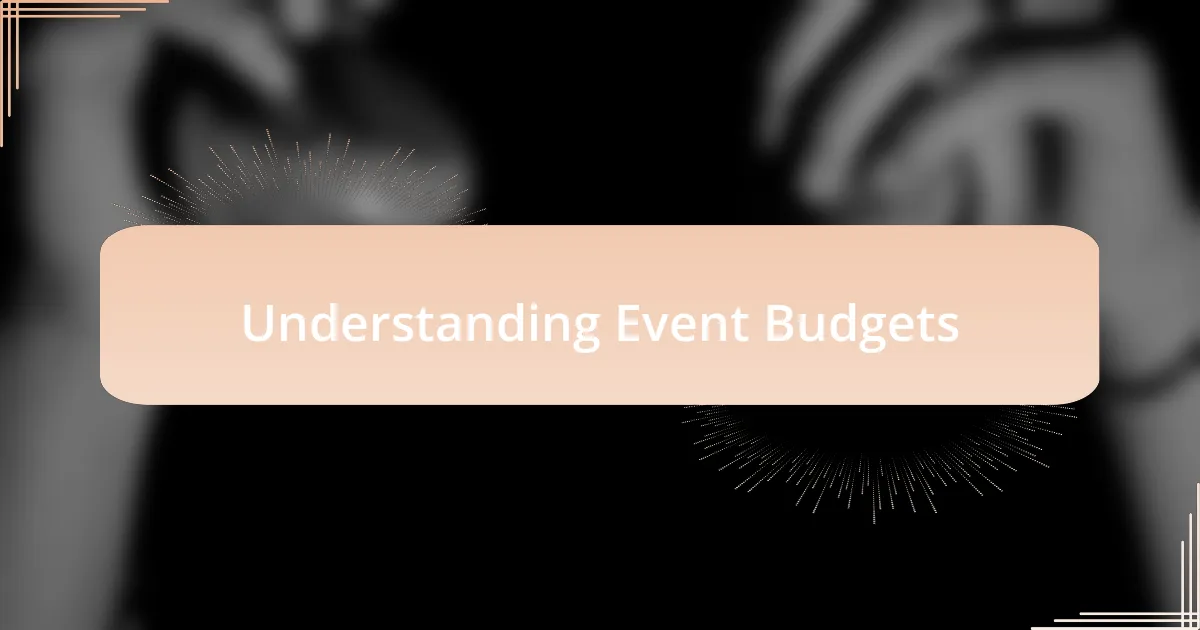
Understanding Event Budgets
When it comes to understanding event budgets, I find it essential to break down every aspect meticulously. For instance, I recall planning a breakdancing competition and being shocked at how quickly costs added up. Have you ever had that moment where you realize the venue rental alone could consume a significant portion of your funds?
One of the most enlightening experiences I had was when I learned to prioritize my spending. During one event, I decided to allocate more to marketing rather than decorations. The turnout exceeded my expectations, and it reinforced my belief that sometimes, investing more in visibility can bring a larger audience to the dance floor.
Another crucial lesson I’ve taken away from budgeting is the value of tracking expenses in real time. I once grappled with predictions that didn’t align with actual costs. I remember making quick adjustments on the fly, which was nerve-wracking but ultimately taught me the importance of keeping a close eye on every dollar spent. How do you monitor your budget during event preparations? For me, it’s not just about sticking to a number; it’s about feeling confident that every expense supports the experience for everyone involved.
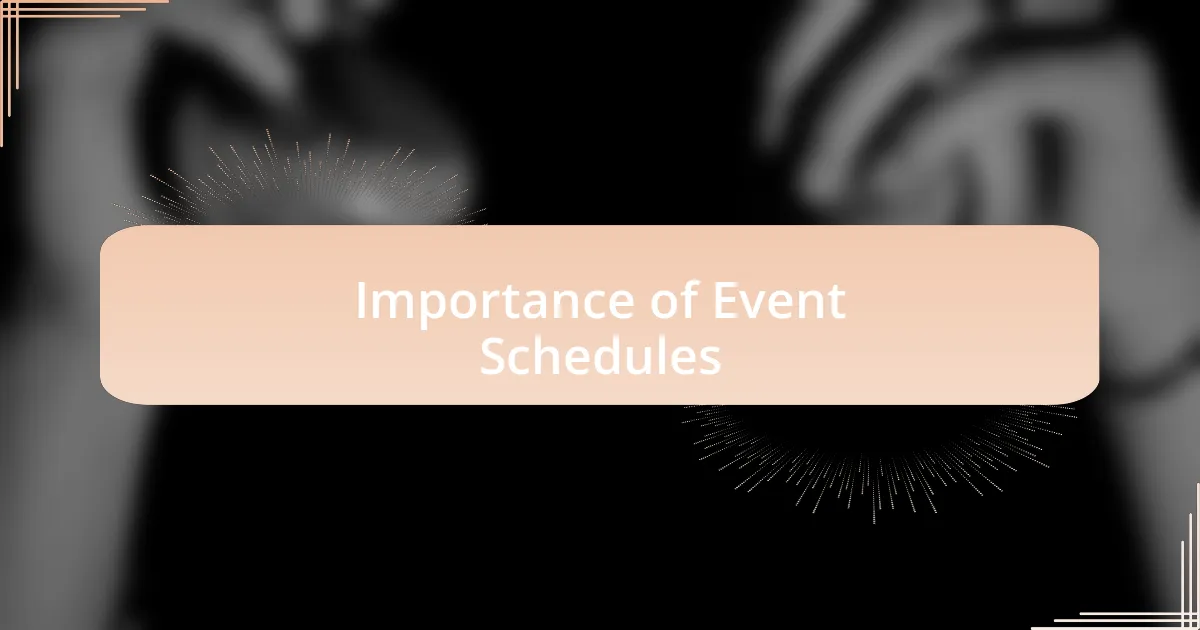
Importance of Event Schedules
When I first ventured into event planning, I underestimated the power of a solid schedule. I clearly remember a jam-packed day where everything felt chaotic. Did I promptly forget to allocate time for battles? Schedule mishaps can derail even the best-laid plans, confirming for me that keeping a rigid timetable is essential for smooth transitions and happy participants.
On one memorable occasion, we experimented with a more flexible schedule for a breakdancing showcase. While it was exciting to embrace spontaneity, the lack of structure led to delays, and I could see dancers growing restless. This taught me that while some flexibility can be beneficial, having a well-detailed agenda ultimately creates a more professional experience for everyone, allowing talent to shine without interruption or frustration.
Reflecting on my experiences, I realize that an event schedule does more than keep things on track—it establishes a rhythm. It engages the audience and ensures that performers can harness their energy during peak moments. Have you ever noticed how a well-timed performance elevates the atmosphere? It’s this rhythm that keeps everyone connected, and I’ve learned that finding that balance is crucial for memorable events.
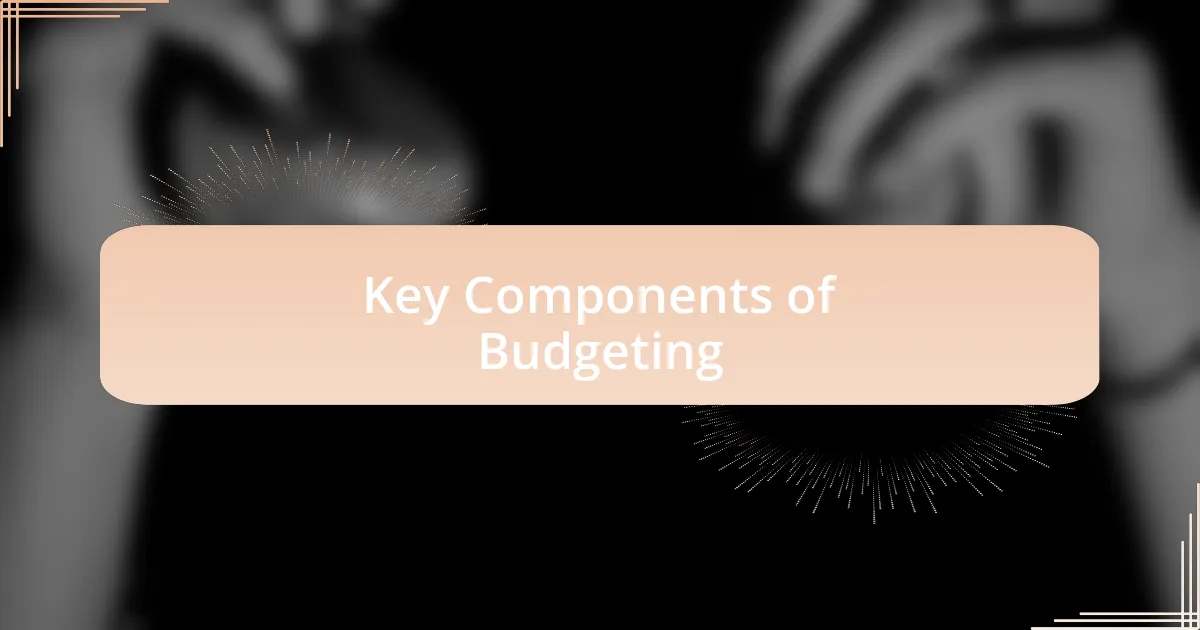
Key Components of Budgeting
Budgeting for an event requires careful consideration of several key components. One of the most critical aspects is understanding the true costs involved. During my early days, I often overlooked potential expenses like venue fees, equipment rentals, and even refreshments for the participants. It was a harsh lesson when I received unexpected bills that strained our funds. Have you ever been surprised by hidden costs? Knowing what to expect can help keep your budget in check.
Another vital component is prioritizing the budget items based on importance. For instance, at one event, I chose to invest more in high-quality sound equipment rather than elaborate decorations. The energy in the room during battles was electric, but I could see firsthand how a good sound system made all the difference. I learned that it’s not always about how much you spend but rather where you allocate your resources that truly impacts the experience.
Flexibility in budgeting can also be a game changer. While it’s essential to have a detailed budget, being open to adjustments is just as important. I remember an event where ticket sales were lower than anticipated, so we had to pivot and find alternative sponsorships and partnerships last minute. This adaptability not only saved the event but also strengthened community ties. Have you ever had to think on your feet to stay within your budget? I can assure you, those moments often lead to greater opportunities.
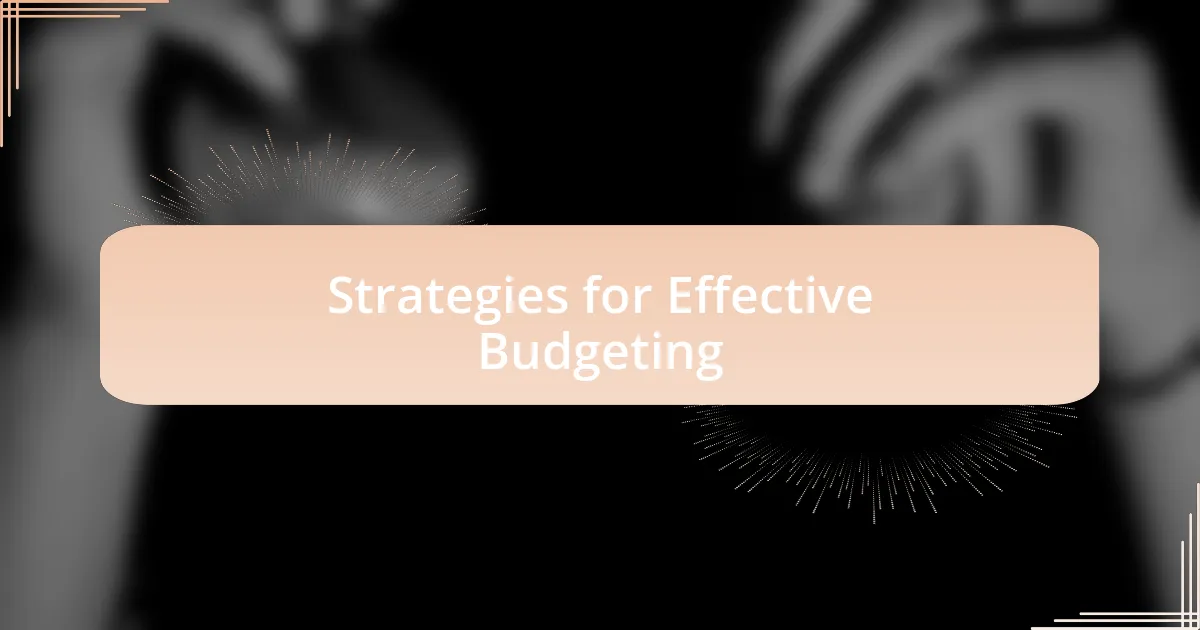
Strategies for Effective Budgeting
One effective strategy I’ve adopted is creating a detailed spreadsheet that outlines every potential expense. I remember the first time I put one together; I thought it would take forever. Surprisingly, the clarity it provided was worth the effort. By breaking down the budget into categories like venue costs, marketing, and prizes, I could see exactly where my money was going. Have you ever tried mapping out your spending in this way? It can really open your eyes to areas where you might need to cut back.
Additionally, I’ve learned that involving your team in the budgeting process can bring fresh perspectives and ideas. During one particular event, I organized a brainstorming session to gather input from dancers and event staff. It was fascinating to see how their insights helped prioritize expenses I might have overlooked, like investing in better judges’ fees to attract top talent. Collaborating like this not only made everyone feel included but also resulted in a budget that truly reflected our community’s values.
Lastly, I can’t stress enough the importance of setting aside a contingency fund—an unexpected expense is bound to pop up. I learned this the hard way when a broken sound system just hours before an event forced me to scramble for funds. Since then, I always allocate about 10% of my total budget for emergencies. How would you handle the stress of last-minute expenses if you weren’t prepared? A well-planned safety net can make a world of difference in managing that pressure effectively.
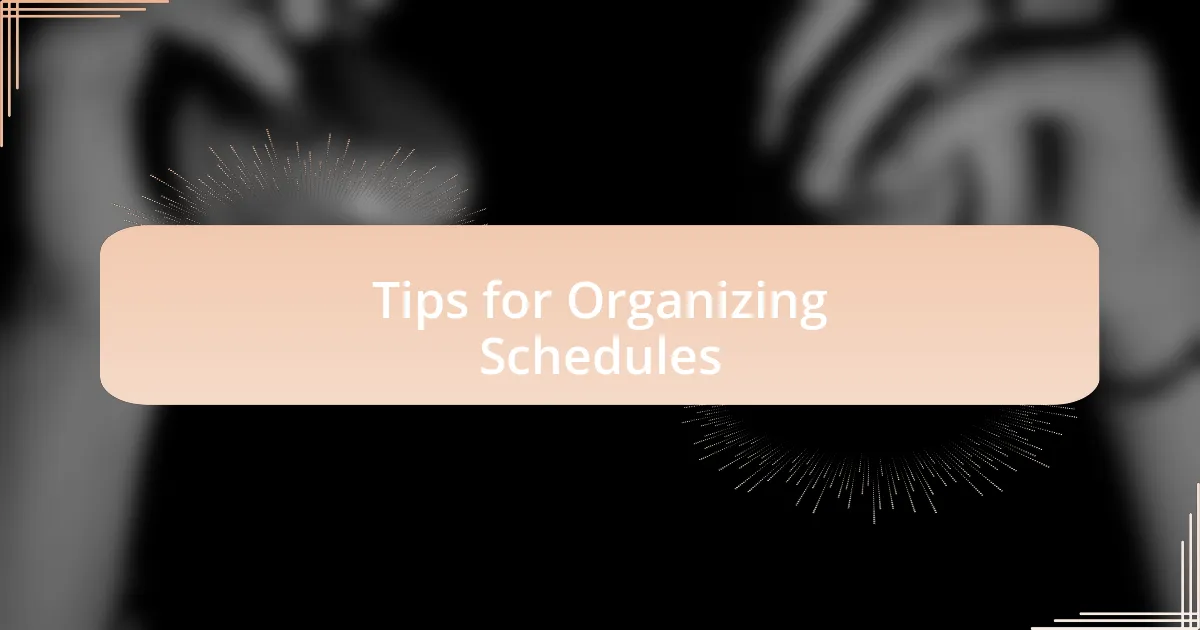
Tips for Organizing Schedules
When organizing schedules, I find that creating a timeline with clear milestones is incredibly beneficial. I remember one event where I mapped out every preparation step, from confirming the venue to scheduling rehearsals. It was like making a roadmap; each checkpoint reminded me of what needed to be done and kept the team on track. Have you ever felt overwhelmed by the amount of planning required? With a visual schedule, those daunting tasks become manageable bites.
I also believe in the power of flexibility. I once scheduled rehearsals too tightly, and it left everyone stressed and rushed. By allowing buffer times between activities, I noticed an increase in productivity and morale. Do you think that flexibility can actually enhance an event’s overall vibe? When we give ourselves breathing room, we create an environment where creativity can flourish and everyone enjoys the process more.
Lastly, utilizing digital tools for scheduling can be a game changer. In a recent event, I tried a shared calendar app that allowed everyone to stay updated in real-time. It was refreshing to see everyone on the same page—literally! The convenience of having push notifications and reminders kept us all aligned and reduced miscommunication. Have you found technology helps streamline your planning? I think it’s a must-have in today’s fast-paced world.
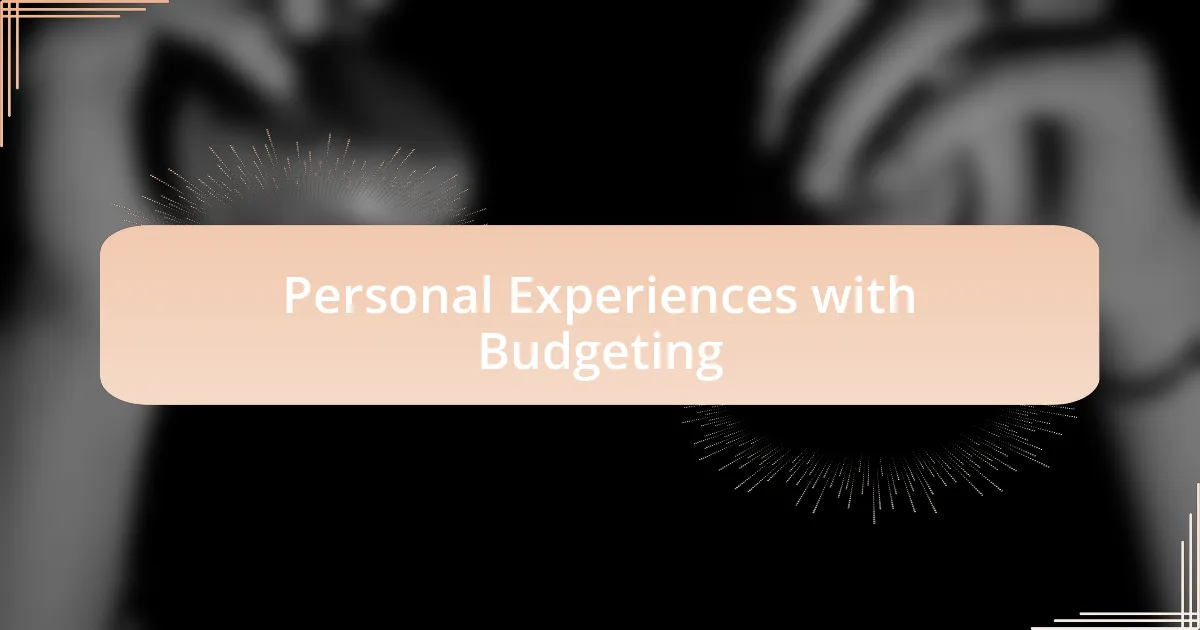
Personal Experiences with Budgeting
When I first started managing budgets for breakdancing events, I underestimated how crucial detailed tracking was. I vividly recall a competition where I thought I had everything covered, only to realize I overspent on promotional materials. It was a learning moment—have you ever faced a budget surprise that made you rethink your approach? From that experience, I learned to create a spreadsheet that captured every expense, and it became my go-to tool for financial clarity.
I also remember collaborating with local sponsors to stretch our budget further. One time, I approached a nearby community center for support and ended up securing not just funding, but also access to their space for free. It was a win-win! Does reaching out for partnerships make a difference in your experience? For me, building these relationships has made budgeting feel less isolating and much more collaborative.
One significant challenge I faced was sticking to a budget during the final stages of planning. I vividly recall an event where I got carried away with last-minute ideas, thinking they would wow the crowd. Suddenly, I was faced with a budget overrun that sent my heart racing! This taught me the importance of discipline—how do you keep yourself accountable when the excitement of planning takes over? I now always set a maximum amount for unexpected expenses, ensuring that enthusiasm doesn’t derail our financial goals.
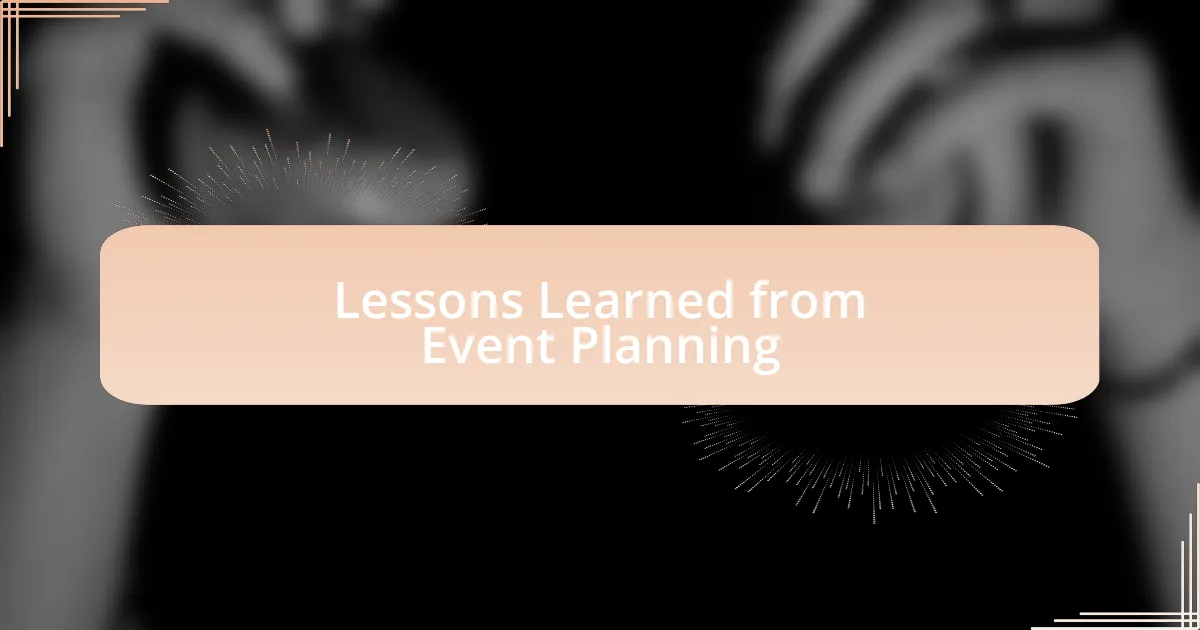
Lessons Learned from Event Planning
I’ve learned that communication with my team can make or break an event. During one particular event, I thought I had outlined everything clearly, but when the day arrived, some roles were still up in the air. I felt a wave of panic wash over me when I saw crew members unsure of their tasks. Now, I emphasize regular check-ins leading up to events; it fosters clarity and builds confidence among the team. How do you keep your crew aligned?
Another lesson centers on the unpredictability of schedules. There was a time when our main judge had to cancel last minute due to unforeseen circumstances, and I can’t stress enough how that impacted our event’s flow. It was a learning experience for me: having backup plans ready is not just smart; it’s essential. Have you ever had to pivot quickly during an event? I now make a habit of preparing alternative options well in advance because a smooth event relies heavily on flexibility.
Finally, I’ve learned the value of feedback after the dust settles. I remember gathering my team post-event and asking for their thoughts. Initially, I felt a knot in my stomach—what if they pointed out flaws I overlooked? Instead, their insights led to tangible improvements for future planning. It made me realize that constructive criticism, though sometimes uncomfortable, can be a blessing in disguise. Do you seek feedback after an event, or do you let it slide? Embracing this has truly enriched my approach to future projects.